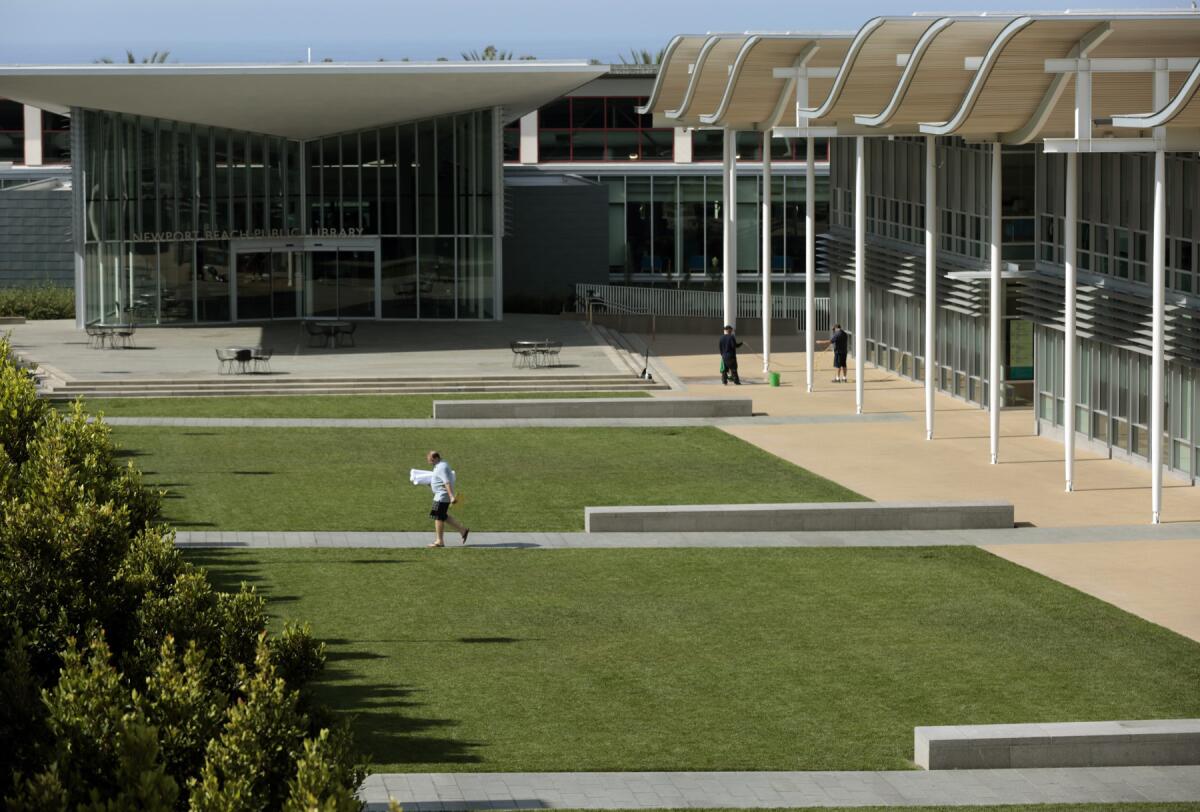What happens when you use less water? In Newport, your rates might double

A pedestrian walks past the lawns between city hall and the public library in Newport Beach April 3, 2015. Newport Beach has been identified as one of the heaviest per-capita water-using cities in the state.
The drought is driving down water use in Newport Beach.
But a consequence of reduced use is a decline in revenue that officials were counting on to help fund necessary improvement projects, such as replacing aging pipelines and sewer stations, to the municipal water system.
Ratepayers may be asked to help close that gap.
City staff presented a proposal to nearly double wastewater rates for customers over the next five years during a study session Tuesday. It would represent the first rate increase in nearly a decade.
Homes and businesses that use water in Newport Beach are charged in their regular bills for wastewater removal and treatment, which includes sewage and water from sinks and showers, known as “gray water.”
Because customers are using less water to comply with standards set forth by the State Water Resources Control Board, which recently mandated that Newport reduce water use by 28%, they are also using less wastewater.
That means lower bills for ratepayers but a decline in revenue for the city. And those declines are expected to impact the city’s wastewater enterprise fund, which finances various improvements to the city’s water system, over the next several years.
In 2013, the city contracted with HF&H, an Irvine-based consulting firm, to have the firm study wastewater and recycled water rates. Based on the results of the study, the City Council decided in June 2014 to halve the cost of recycled water to ratepayers.
However, the study indicated that the city needs to bulk up its fund for wastewater if it wants to pay for necessary improvements to an aging system.
The projects are expected to cost roughly $30 million over the next 30 years.
The city is contributing half a million dollars each year to the improvements, said George Murdoch, the city’s utilities general manager.
HF&H projected that the city will have to dip into reserve money to fund the projects, which are expected to deplete $900,000 that the city has in wastewater reserves by 2017.
“You can see where we’re a little bit short,” Murdoch said. “We’ve had an aggressive program, but we need to step it up a bit.”
If the council eventually approves the rate hike, it would be the first increase seen by ratepayers in the past nine years, said George Murdoch, utilities general manager.
A typical single family home pays about $9.75 per month for wastewater. The proposal to increase the rate structure would mean that the same home would pay $13.79 per month by the first year, $16.27 per month by the third year and $18.04 per month by the fifth.
Wastewater rates for homes and businesses are comprised of a fixed fee, sewer charge and two additional surcharges of $2 per month for each additional house on the property and $10 per month for customers with larger water meters.
The staff proposal eliminates the surcharges and moves the cost to a monthly fixed price for sewer service based on the size of the water connection and sewer use charge, which is a monthly fee for all customers based on their water use.
Councilmen Scott Peotter and Kevin Muldoon asked city staff Tuesday to look into the possibility of outsourcing portions of the city’s wastewater service as a means to cut costs. Currently 13 employees manage the city’s wastewater.
City Manager Dave Kiff emphasized that it’s important that Newport Beach keep the same level of service because of its close proximity to Newport Bay.
Unlike inland areas, if Newport Beach has a sewer line break, officials need to respond quickly before it causes environmental damage.
“We don’t have a lot of time to catch it before it gets into the bay,” he said.
Mayor Ed Selich indicated he was not in favor of reducing staffing levels at this time.
“Given the criticalness of water quality, and all we’ve invested in it, I think we need to maintain our own destiny,” he said.
The council will consider the rate increase formally during a future nighttime meeting. The public will have 45 days to make comments before any increase is finalized.